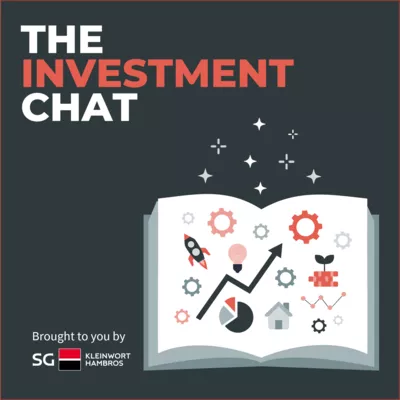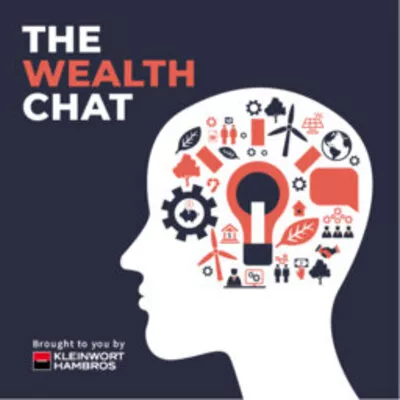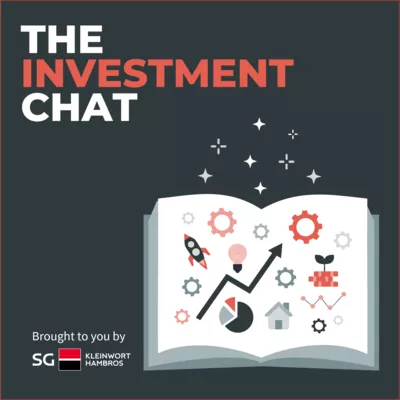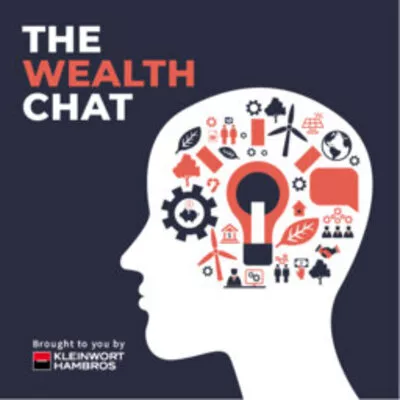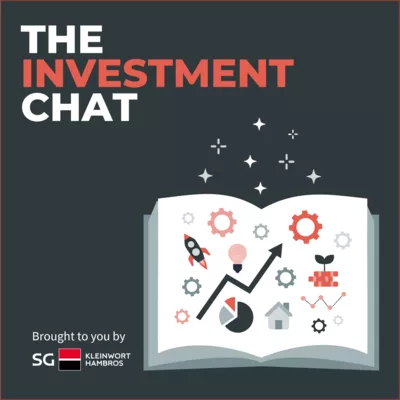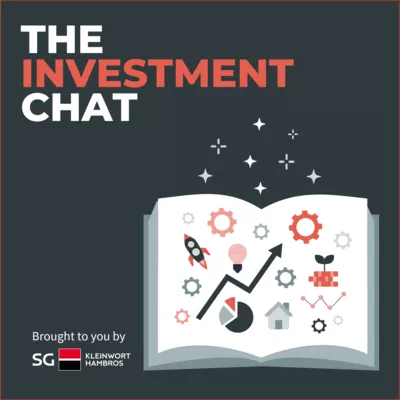
IMPACT ENTREPRENEURS, Advanced Plastic Recycling with revalyu Resources
Transcript
The Entrepreneurs Chat
Ep 2 – revalyu Resources
00:00:04
James Hurley: Hello, and welcome to The Entrepreneurs' Chat, a podcast brought to you by Kleinwort Hambros. I'm James Hurley, Deputy Business Editor at The Times, and I'm your host. From startup to sale and everything in between, building a business can be rewarding, frustrating, expiring, exhausting. It's certainly never straightforward. This is the show where we go behind the scenes, examining the highs and lows that come with growing a company. Today I'm talking to Vivek Tandon, chief executive and founder of revalyu Resources, a fast- growing recycling and manufacturing company.
00:00:35
Vivek Tandon: When you're doing a startup company, you're almost always held by how much funding and money you can raise. And definitely in the early days when we started this company, trying to raise money to recycle plastic bottles was a huge challenge, a huge, huge challenge. And there were not too many interested investors to put money in that.
00:00:56
James Hurley: revalyu Resources is tackling one of the many pernicious environmental issues facing the planet. The shocking plastic pollution famously highlighted by David Attenborough in the BBC's Blue Planet a few years back. Approximately 1. 8 billion plastic bottles are discarded every day, but Vivek's company wants to help deal with the flood of waste. It's commercialized a recycling technology and has upcycled more than 6. 5 billion bottles into a compound, which in turn can be converted into a fabric which can be used in clothing.
Today we'll hear about Vivek's entrepreneurial journey and how he believes the recycling industry, which faces questions about its own impact on the planet, can make a difference. Vivek, welcome. You've been involved in plastic recycling since about 2004, haven't you? Long before it was fashionable, of course. Are you surprised it's taken the rest of us so long to catch up?
00:01:51
Vivek Tandon: Yeah, 2004 is when it was publicly looked at in terms of making the mark in the industry, but I've been sweating about it and thinking about it really since as early as 1996, 1997, and that was when I first came across the problem and wanted to find a solution.
00:02:11
James Hurley: Yeah, Vivek, tell me a little bit more about that then. What was it that inspired you to be interested in this area? As I mentioned Blue Planet there, it's become a cause we're all familiar with and there's horrifying sites of what plastic can do in the oceans, but it wasn't really being discussed so widely back in the nineties, was it? How did you come across the issue and why did you want to set about trying to solve it?
00:02:31
Vivek Tandon: It came about really because I disliked the use of two words. I disliked the words waste and I disliked the words use. And as I looked around the industry, I came across a company which was called Alcan. And Alcan had developed a technology to truly recycle aluminum cans. And it became clear to me that long, long time ago aluminum cans were considered the plight of the earth and you'd find those lying along beaches. And people would collect them, but they would treat them as waste, rather than try to apply a technology to it in order to convert it back to a high- value product.
And as I started to look, not just at plastic actually, I looked at a lot of other pollutants in the industry, including batteries and laptops and fridges and washing machines. But plastic was one of those which I felt had the potential to follow a same route to that of aluminum, i. e create and develop a technology that could then mean that plastic bottles could be infinitely recyclable and hopefully the dream is one day, similar to aluminum, 80 to 90% of all the PET plastic we use in the world can come from already used, rather than from oil. And that's what set me about my task. Really it was then looking out in the rest of the world, applying to universities, checking out patents, looking at companies and finding out who had ideas or was developing technologies to truly be able to recycle a plastic bottle, rather than just to waste manage it or downcycle it.
00:04:18
James Hurley: And we'll hear all about that technology shortly, but can you just explain to us why you were interested and passionate about recycling sustainability of the environment in the first place?
00:04:28
Vivek Tandon: Actually I started off my career actually in telecoms and rode that telecommunications boom up to the 1980s and the '88s, and was very fortunate to be part of that. As being part of that whole lovely boom period, I got to work with phenomenal entrepreneurs all across the globe. I also got to benefit financially from that boom. And so the next question for me was, " What do I want to do with myself?" I looked at charities and doing charitable work in Africa particularly, because that's where I grew up most of my life, in Southern Africa and East Africa. But there was a lot of money flowing into charities and it became quite clear to me as early as the 1997s, 1998s, that actually one of the biggest plights that was starting to impact the developing countries was climate change.
In those days it wasn't necessarily called climate change or I didn't know it as climate change, but you could see the impact that it was having on people. And so that's where I wanted to put my efforts into. From I'd say about 2000, really 2000, 2001, I really started to focus on environment and sustainability and what we could do there. And then plastic was a good one. Tires and tire recycling was another one. White goods and electronic batteries and car batteries and lead batteries and fridges and all of that stuff came to the forefront.
00:05:48
James Hurley: And you started revalyu as perPETual of course, under a different name, I think in 2014, didn't you? How did that come about? Tell us about the origins of the company?
00:05:56
Vivek Tandon: Yeah, so actually, and this is also potential inspiration. The recycling of plastic bottles had been going on for 20, 30 years. It's been recycled into many products for a long time, but the technology that's been used to recycle it has been based on what's called mechanical recycling. And what mechanical recycling does is it really just takes a plastic bottle, cuts it into small pieces, and then it tries as best as it can to clean the surface of the plastic and extract as much dirt from the surface of the plastic as it can. It then goes through a process of melting and is then made into products. It's then made into various products like furnishings for your garden, your garden furniture, piping, but also it was made into a lot of what's called staple fiber. And staple fiber is a lot of the stuff that you use in cushion covers and stuffed toys, in your coat lining jackets. Anywhere where you required a textile, but it didn't have to be such high quality, put it that way.
And the reason for that is when you did it mechanically and you cleaned the surface of the plastic, you couldn't get the contaminations that were absorbed into the plastic. Inevitably you get contaminations inside the plastic like the molecules or flavor molecules, bacteria, color is another good contamination. The question then was, how could you do this more efficiently, more cost effectively, more environmentally friendly as well, because mechanical uses a lot of water and caustic to wash, and effectively produce a product that had greater or higher quality than virgin material?
And so that then was more luck than anything else. I stumbled across a company in Australia with a great inventor by the name of Simon West, and Simon and his team had developed this potential breakthrough technology to be able to truly depolarize a plastic bottle and then clean out almost all the contamination and essentially create a product that's called an ester. And an ester is essentially the same chemical composition that you'd normally make from oil and gas. Normally if you wanted to make a plastic, you'd start from two chemical materials in oil called PTMEG, you'd mix PTMEG you'd get ester. And what Simon and his team did is they figured out how to get exactly the same ester, but taking it from a used plastic bottle. And that was the start of the journey.
00:08:31
James Hurley: And so presumably that gives you a product that's much earlier stage than a recycled plastic that's got problems, so presumably widens the potential applications significantly, does it?
00:08:42
Vivek Tandon: The best way to think about ester is ester is your base. It's almost like your base Lego block. It's your base chemical material. You're right, so this ester can be used to replace ester that normally comes from oil and gas, and from this ester you can then make more bottles, you can make clothing, you can make packaging, clingfilm, and you can use it for a whole bunch of other products which are called co- polymers. For example, 3D printing ribbons, that would be co- polymer off an ester, and various other products. But yeah, anything PET plastic- based would derive from an ester.
00:09:17
James Hurley: And what supply chains have you managed to get this into so far?
00:09:20
Vivek Tandon: That's a good question there. Supply chain is twofold. One is getting the actual plastic bottles to process, but we can come back to that. And the second part of the supply chain is actually selling this product into the market. Today our, believe it or not, our plant in India is considered relatively small compared to the general ester market, i. e, we recycle about four and a half million bottles a day and we produce about 40 tons per day of ester, which you would think, " Wow, that's huge. That's really big." Actually, the total market for ester, just for the textile industry alone is about 52 million tons a year. When you consider we're doing barely 40 tons a day or 30,000 tons a year, there's a huge, huge demand.
Your question of where we've put it into the market today, right now we've been focused on the textile industry. And the reason for that is going back to 2014, 2015, there were good groundbreaking companies like Patagonia at that stage, which were trying to promote sustainable products, sustainable clothing, and that industry of sustainability in the textile industry had already initiated itself, it was already starting, So, getting to that market for us as a company was much easier. And then there were a lot of big brands who tried to also enter that market, for example, Decathlon, Adidas and today it's almost everybody. In fact, the shirt I'm wearing is made from 100% plastic bottles, as are the shoes, but you can't see those. Today we've penetrated predominantly into the textile industry, and that's where we sell most of our products.
00:10:53
James Hurley: How does it compare on cost to using a traditional plastic? If I'm a clothing company, do I have to pay more for your raw material versus the traditional plastic?
00:11:04
Vivek Tandon: The cost of production of the ester, believe it or not, and this is again quite surprising to most people, the cost of production of the ester is actually similar in price to the cost of production of the ester from oil and gas, which is actually quite a surprise if you think about it, given that this industry is focused on driving costs down through scale. When you look at a big plant normally producing ester, they might be doing approximately as big as 1, 000,000 tons a year, and we're producing 30, 000 tons a year. But even at that level, we can be cost- effective. That's the first step.
The second step is the price at which it sells at. Because the demand is so huge today and the supply is so low, you're actually able to sell this at a premium to virgin ester. And brands are willing to buy it. And to some degree one can understand that as well. Because if you look at a typical T- shirt, a high quality T- shirt from one of the big brands might be 30 or £ 40, whereas the actual ester and the polyester, which is what you make, so you make many chains of ester to polyester, your polyester could be as low as 40 to 50 cents in terms of raw material. So for them to pay a slight premium to get it is not too much of a disruptor.
00:12:25
James Hurley: That makes sense. Although, as you say, I am somewhat surprised by that, because often when you talk to companies that have come up with impressive bits of green technology, the challenge they often face is that they can't make it cost- effective versus the incumbent product, so you're in a great position from that point of view.
00:12:41
Vivek Tandon: Well, that's because you're talking to me in 2023. If we had the same interview in 2015, I'd have been saying, "Well, really expensive." We just sell it two and a half times the price. It's like I think people ... This is not my first startup company, by the way, I've had several. But they all follow quite a similar line, i. e. you start off with the idea and the technology, then you have to go through to a prototype pilot stage, and then you build a first commercial stage plant. And that process in itself can take you anywhere between three to five years or six years. Once you've done that first commercial plant, you then have to spend another two, three, four years driving the cost out of the system. As you mentioned, although we've been very low- key and kept a very low profile in the market, we've actually been around since about 2005, 2006 in terms of developing.
It's taken us 20 years to get here. And hence my answers to you today are almost happy and arrogant as opposed to had you interviewed me 10 years ago I'd have been on my knees complaining.
00:13:49
James Hurley: Well, you actually anticipated my next question there, Vivek, because I presume the answer to this is many, but what have some of the biggest hurdles been in getting the company to this point over what is, as you say, quite a long journey?
00:14:03
Vivek Tandon: This company has, like most of my other companies been close to bankruptcy a few times. And at least on a knife edge. I mean, when you're doing a startup company, you are almost always held by how much funding and money you can raise. And definitely in the early days when we started this company, trying to raise money to recycle plastic bottles was a huge challenge, a huge, huge challenge. And there were not too many interested investors to put money in that. You literally raised money, made a development, hoped that that development would be sufficient to get the next investor on board to take the development further. And these are quite expensive plants. To build a 30,000 ton plant to recycle PET, you're talking about 50, 60 million dollars, so this is not small chump change. And every time you run the plant and operate the plant, if you have a failure, you pretty much have to clean the entire system, clean out the pipes, get those all sorted out. That's one.
Two is also, one of the biggest challenges in the old days again, now it's much easier because the consumers are helping to drive it. But there was always this perception and there has always been a perception until really just maybe five, six years ago, that something recycled is inferior quality. And one of the biggest challenges was trying to explain to people that recycled material when done properly and truly recycled, not waste managed, can have the same and equal quality to that of traditional virgin material.
And I still get the feedback today when somebody comes in, they touch your shirt and you go, " This is made from plastic bottles." They go, " Oh my god, it feels so good." And you're like, " Yeah, it's exactly the same quality, why shouldn't it feel good?" So, you still get that reaction today, and that is hopefully a perception that is changing quickly. But changing consumer behavior and working with the brands to first convert them and get them to move down the line of realizing that you can buy this and it's the same quality, and then they getting the consumers to do it. That's probably the biggest challenge, if I can be honest.
00:16:14
James Hurley: And what's kept you going through those difficult times? You said a couple of times the company was on its knees, you weren't quite sure if you were going to be able to keep going. What kept you going?
00:16:23
Vivek Tandon: Oh, you're asking me, you're asking my wife and my team. Madness. No, genuinely, honestly, I love building companies. I have the bug in my blood to make big innovations and to really push innovations. I've always believed in this technology, the technology that Simon developed and the engineers developed and that we improved and perfected. There's never been a shadow of doubt in my mind that this is a game changer. It has been very clear that this will do, without shadow of a doubt, this will do for the plastic PET bottle industry what Alcan did for the aluminum industry. I am a 100% convinced and always have been that come 20, 30 years from now, PET plastic bottles do not need to be made from oil anymore.
That's been the big, big driver. And then to be honest with you, at every step of the journey we have had fantastic people who've backed us, either financially or teams and employees and staff who work sometimes without salary or long hours. When you've got this big movement of people who are supporting you, mentors, investors, team members, on those down journeys it helps to lift you, because you know you can't step away.
00:17:38
James Hurley: As you mentioned, this wasn't your first rodeo in any case, you'd already founded and sold businesses before this one, were there any lessons that you took from that experience that also helped in terms of resilience or making the right decisions or indeed overcoming mistakes?
00:17:52
Vivek Tandon: Yes. One lesson that I've learned with startup companies is focus. It really is about keeping your head down and getting on with the job. And this is my advice to almost all entrepreneurs. In fact, if you look at revalyu, people really haven't heard about us at all. We only had our first website up and running in about 2016 after we've been operating for almost 10, 12 years. And I think one thing that entrepreneurs do too quickly is come out to market and start to talk about themselves too quickly. Because then you get pulled in all sorts of different directions. And people always used to say to me, " You're not at this conference and you're not at that event and you're not at this conference." And I'd be like, " Well, to be honest with you, we only have one customer and we're only making enough product for one customer. There's no point in me going to conferences, et cetera to talk about it more. I don't have enough capacity or production capacity."
And if you go and talk to different customers, what you often find is different customers pull you in different directions. One customer might want you to make yarn that's good for sportswear and another one might want you to make yarn that's good for high- value products or suiting or whatever. You have to know what you want to do, keep your head down focus, and also focus on making a product that is going to be able to compete with existing on the market, I. e., know the value of it and know how you can penetrate the supply chain.
That's really critical, because you see a lot of developments in the industry as you correctly said earlier on, where you think, " Okay, that's a really great technology, it's a really great product, but are you really going to be able to get people to buy that in volume, or is it just a nice niche?" And for me, I really want to look for technology that's going to make a fundamental, big substantial difference, not just a niche marketing or green washing.
00:19:48
James Hurley: It's really interesting to hear you say that, because I often get approached by companies who, as you say, have got really interesting technology doing in interesting things, but they haven't even got a customer yet quite often and they're already promoting it. It's really interesting to hear that you've come it from a completely different angle and haven't had a high profile, but then when you start to talk to the world, you already actually have got billions of plastic bottles behind you, so presumably puts you in a much stronger position than to deal with incoming inquiries, find new partners, et cetera?
00:20:19
Vivek Tandon: Yeah, I suppose we're a bit lucky in the sense that we are focused on business to business, not business to consumer. I suppose if my product was more business to consumer side, then yes, I would probably have to promote and talk about ourselves more and get ourselves more into the wider market. But given that we're quite clear business to business and quite clear who we sell to, and given our production, as I said, is quite small relatively speaking, we haven't had to go down that route of marketing ourselves so widely.
00:20:48
James Hurley: And how much capital has it taken to get you to this stage?
00:20:52
Vivek Tandon: Don't know if I'm allowed to disclose that, but in terms of development, research, R& D, building the plants, we're definitely talking north of a 100 million.
00:21:03
James Hurley: Wow. And have you got any advice for people who might be listening, who are trying to raise money for something and need to convince investors of the value there earlier on that journey than you are? Well, what tips have you got for convincing investors to get behind you?
00:21:15
Vivek Tandon: I have been very fortunate to some degree, again, because this is not my first one, I've had good strong investors who've backed me in my previous companies who backed me again now. I've been quite lucky to have a set of investors who've backed me through several of my businesses. It is a hard one, because when you are raising money as an entrepreneur, to be honest with you, you'll take money from whoever gives it to you. I can give you a great theoretical advice how I did it, but that wouldn't really help the average entrepreneur out there. The average entrepreneur, what I would say again is, keep it very, very focused. Know exactly the problem you're trying to solve. Know how once you solve that problem, the value that it has to the end customer. And then you really just have to hit the market until you find the right investor who follows your passion. That's one.
And then the second thing I find people probably don't do well is actually more keeping very transparent and having the investors really alongside you as a partner, not just as an investor financial. I've been very fortunate over the last 20, 30 years that all the investors we've invested in have really taken a passion for the business and understanding what we're doing. And the reason that's so important is you can almost guarantee that whatever path or route that I'm deciding to do today in May 2023, it's going to be different in May 2024. And there's so many things that are going to happen between now and May 2024 that I will not have thought about, but if my investors are working alongside me at every step of the way, then they understand that journey that we're taking. And it's not a shock to them in 2024 that we might be doing something different or not as succeeded, because they're part of that process. Taking them on the journey with you once you have them as investors is actually, in my opinion, almost more important than raising that money in the first day.
00:23:11
James Hurley: You mentioned the phrase entrepreneurial bug a little bit earlier. Can you tell us when you first got bitten, you started off in jobs in marketing and business development, didn't you? What first got you started on wanting to get your own company off the ground?
00:23:23
Vivek Tandon: Oh, actually, I've had this entrepreneurial bug since the age of about 10 or 11 years old. My first business was really when I was very young, at the age of about 10, I went to a boarding school in the Himalaya Mountains in India. And in those days in India you weren't allowed to get Coca- Cola. It was only two local brands called Thums Up and Pepsi. But I was in an American missionary school, so it was a missionary school called Woodstock School, and you had a lot of students there who really wanted Coca- Cola and Mars Bars and Snickers and all the great American brands. And there was a great American embassy in Delhi.
I'm not sure I'm supposed to be telling all this story, but you managed to get it out of me. I found a way anyway of acquiring or buying Coke and drinks down from Delhi and bringing them up to the school and reselling them there. And I suppose that's where the entrepreneur kickstarted. And then I grew up, as I mentioned, in various parts of Africa and there was always opportunities in Africa. One of the other companies I had was importing in those days VHS and Beta Max cassette tapes into Southern Africa. I used to do that at the age of 12 or 13 from Taiwan, then moved onto importing sunglasses and other gear into there. Always really had small entrepreneurial businesses. But probably the first, when I came to university in Imperial College to do my physics degree in London, that's when I started what I would call probably my more established business, which was an international callback company, which I did from my university room. And that's actually how I also met my wife because she then got involved with me on that business. And we've been together ever since. I think we've been together now 30 years.
00:25:11
James Hurley: That's fantastic. And was that your first big success? What was your first big hit as an entrepreneur as it were?
00:25:18
Vivek Tandon: Depends how you define success, really see people define success as financial, and I'm not so sure I define it just as financial. My first big success financially would have been the international callback operating company. But to be honest, on every single company that I've been through, there are successes. There are successes when people you meet people, relationships you keep, relationships you have for 20, 30 years who become your mentors. Investors you pick up along the route who help you on your next venture and your next startup. Mistakes that you learned throughout.
But yeah, I suppose financially probably I was lucky to be hired into a company called Ciena, C- I- E- N- A. And Ciena was a company that was developing very breakthrough optical telecom networks and optical switches. And I happened to do my PhD in that. And I was recruited by somebody there. And at that stage I always thought about myself as an engineer and a physicist. And I remember this mentor, his name was Rich Daley, and (inaudible) and Rich Daley and (inaudible) gave me the confidence to believe in myself that actually you know can also sell and you can make things and you can build things, so you're not just an engineer. And that was probably my biggest confidence boost that really helped me.
00:26:33
James Hurley: That's a unique combination, well not unique combination, but a very strong combination of skills, isn't it, to have the technical background but also to be able to sell. Because often it's one or the other. Do you feel that's helped you achieve what you've achieved so far in your career?
00:26:45
Vivek Tandon: Very, very, very much so. There's several things that help in your career. Having a great family helps you a lot as well, because you don't have to worry what's going on at home and you can focus all your efforts on the business. As I said to you, it's always about focus, focus, focus. If you can focus on the business and not have to worry about other things in the background, that helps you a lot. If you have people who are supporting you during the downturns and when you're making big mistakes and are coming up and giving you that pat on the shoulder saying, " Don't worry, you're doing okay. Keep going, keep going, you can do it." That's a huge, huge, huge strength. That's really what helps you to make it. And what you do realize is it really is a case of hiring great people around you. What you really want is people with fabulous ideas with no egos, people with no egos or fabulous ideas are just their weight in gold. And you can solve really amazing problems in this world.
00:27:41
James Hurley: And you mentioned your connections to Africa a moment ago. Are you still involved in projects on the continent? Can you give us a bit of a flavor of that?
00:27:48
Vivek Tandon: Yeah, I really have a passion for ... For me, Africa is almost ... East Africa and Southern Africa as opposed to North Africa. I grew up most of my life in East and Southern Africa and I really have a passion for Africa. It's one of these continents where unfortunately the people have been held back or used and abused in my opinion for so many centuries. But yet when you go there, it's the warmest environment, not in terms of climate, but in terms of people. The warmth that the people, if you go there, you always find them smiling, right? They're always happy to invite you into their home and talk to you about what they need to do. Yes, I am involved in projects in Africa, both in terms of trying to find new companies in terms of building plants that recycle plastic bottles there, or more working with entrepreneurs. I spend a lot of my time working with entrepreneurs in Africa, advising them, helping them, introducing them to investors, helping them to introduce them to customers. Whatever way I can help an entrepreneur, I'm always there with an open book.
00:28:54
James Hurley: And as a guy who's spent his career interested in innovations and what the next big thing is, what areas are you most interested in terms of recycling? For instance, might quantum computers help in terms of materials development, or AI? Are there trends that you are coming across that you're intrigued by? What are you most excited by?
00:29:13
Vivek Tandon: One of the problems we have had today is that we make products and then after 20 years we think about what we're going to do with them. And really what we should be doing is thinking about them today, now at the time of development, as to what's going to happen in 20 years? For example, the answer to your question is, today you might be deploying, " Great, solar panels are fantastic, let's deploy solar panels." But solar panels themselves have changed dramatically over the last 10 years. The yields on solar panels 10 years ago and the yields of them today are drastically different. They're almost two and a half x improvement. People are now starting to pull out solar panels and replace them with newer ones, or if not that, even they have an end of their life, 50 to 20 year- end of life.
Well, what's being done to consider recycling those? What technology? As I mentioned, to recycle plastic bottles took us approximately 10 years to develop the technology and another 10 years to commercialize it and drive the cost down. It takes 10, 15 years, 20 years to develop a technology to recycle. When you're developing a product like a solar panel, you need to start now. You need to start the technology now on how to recycle it. And in fact, if you start now on how to recycle it, then you potentially would make the product differently. The converse of that is something like a car tire. Car tires are either blight also, they're like plastic bottles, they're everywhere and they're terrible, they're terrible for Africa, they're terrible for development, but there really isn't a technology today that can recycle a car tire. People do. They cut it up, they crumb it, they waste manage it, they burn it, they do everything else, but it's such a complicated piece of equipment and design with metals and different products inside it that it's so hard to recycle.
Again, coming back to that, if we could find a technology to recycle car tires, that would be amazing. I've looked at I think two to 2, 500 companies the last 20 years and not found one yet. I would love to be able to develop a technology to do that, develop new technology to recycle. We should be doing the same thing for lithium- ion batteries in cars. The government, in my opinion, should be charging now, what 2% of the price of an electric car today to recycle those batteries that are going to definitely be on the market, and we should be doing that now. Putting a cost into the products upfront for their end of life is critical. And then using that money that you put on the price of product now to invest in developing technologies to help those entrepreneurs who have the ideas and to give them that kickstart that you said at the beginning of where you get your first investors, that's where that money should come from.
And even if that money goes into universities, a lot of great, treat fundamental research is done at universities, which can then be spun off later on. I think it's a win- win. Charge some of those companies, take that money for recycling, fund it into universities to do the research to recycle, and everything comes back round again.
00:32:09
James Hurley: And on that theme, what would you say to people who say recycling itself is part of the issue? Because in terms of it might reduce guilt about consumption or it might feed back into unnecessary consumption because it allows the continuance of, for example, plastic bottles or fast fashion or whatever it might be. What was your answer to those concerns?
00:32:30
Vivek Tandon: Again, it depends what you define as recycling. Again, my definition of recycling is taking a product, applying technology to it to create an end product that has equal or higher value to virgin material. And that for me is really fundamental to get across. Because traditiona
Ask us your questions
Contact usLatest podcasts
